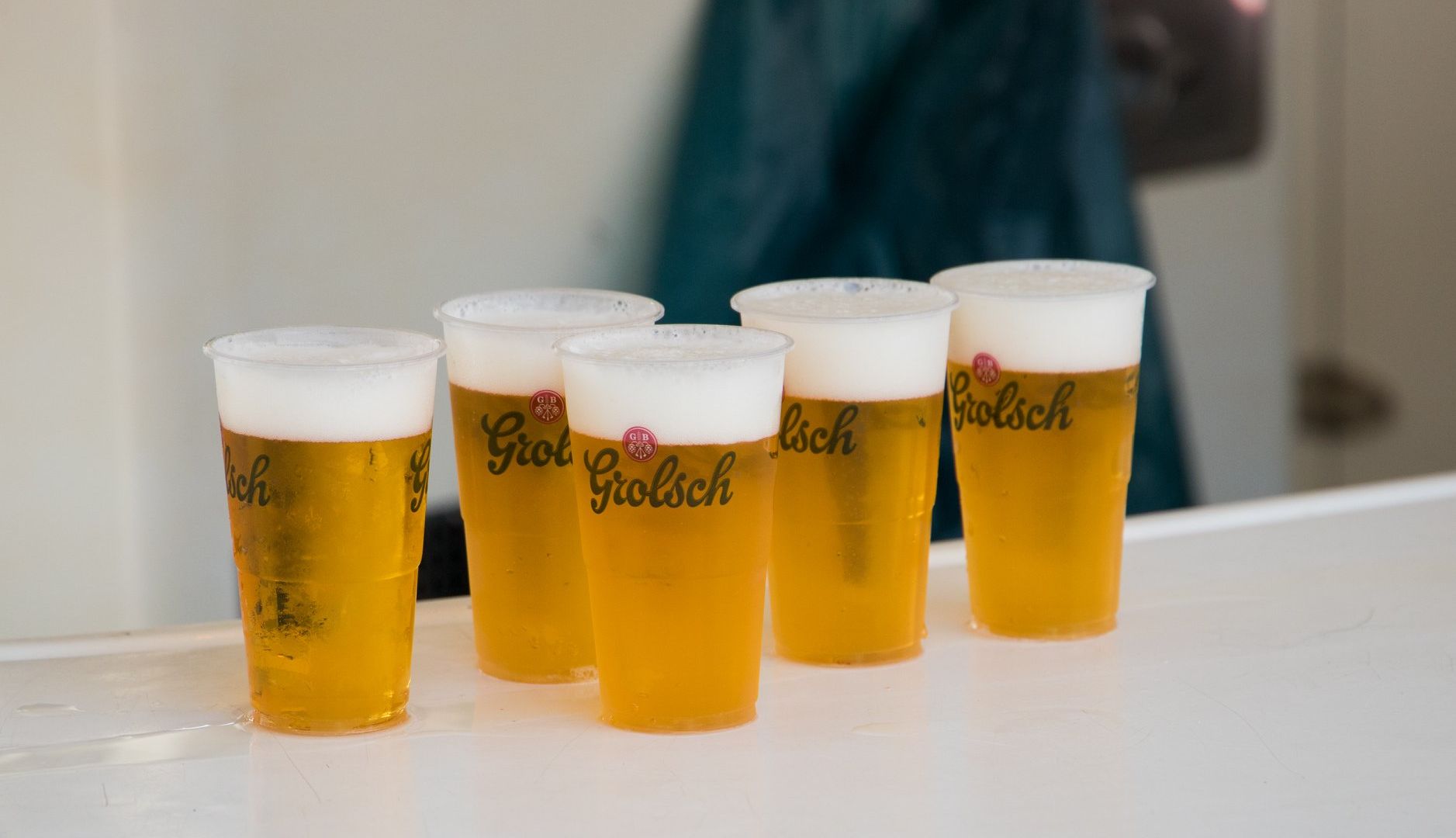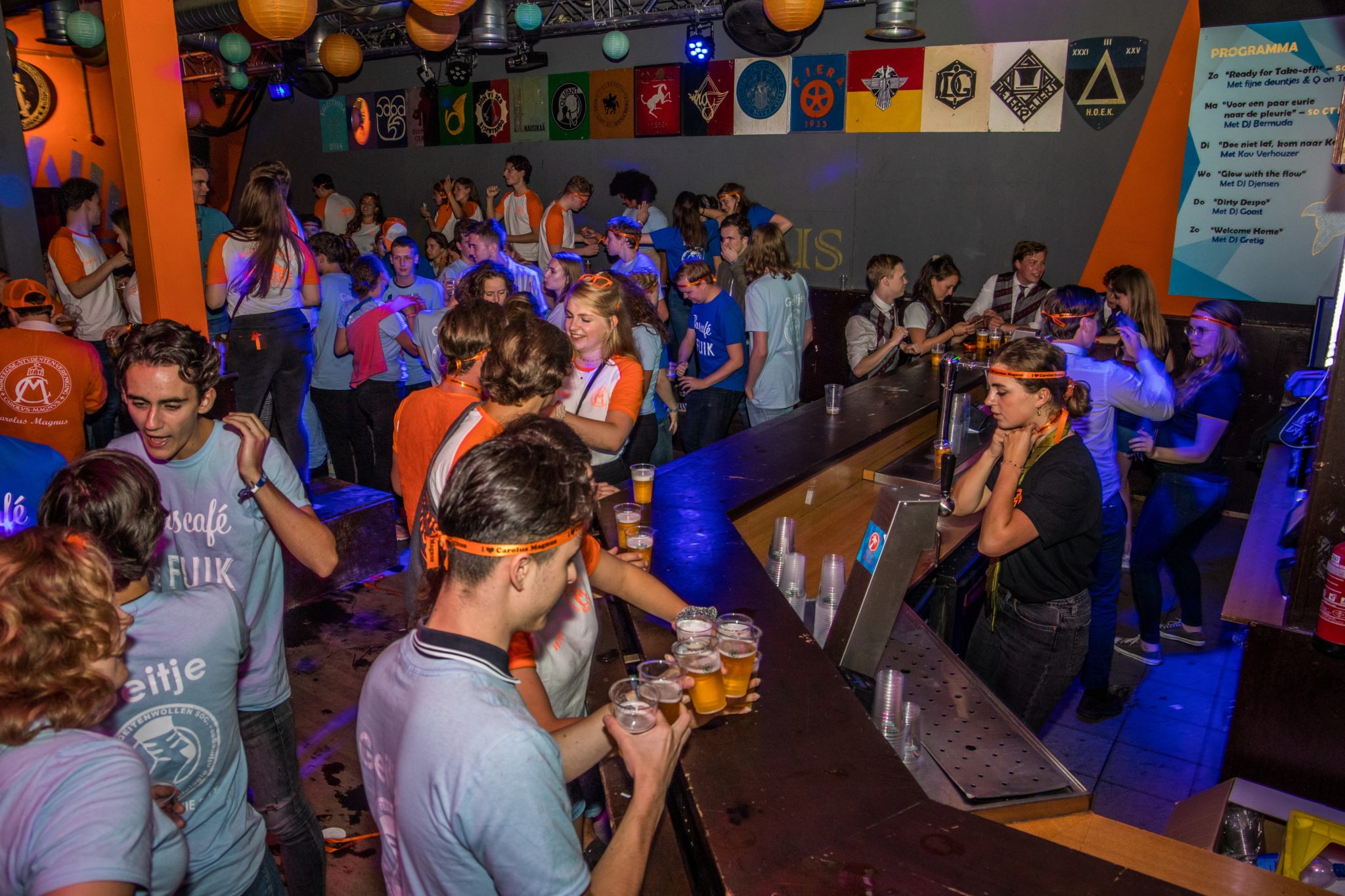Students consume less drugs and alcohol during corona, but ‘worrisome’ subgroup consumes more
-
 Foto: Tom Hessels
Foto: Tom Hessels
Most students have drastically reduced their alcohol consumption during the coronavirus crisis. Substance use has also decreased. You may think this is great news, and it is. But there’s also a small group who are drinking more, not less, because of loneliness, stress and other factors. ‘We should really keep an eye on these students,’ warns substance use and addictive behaviour researcher Jacqueline Vink.
Online lectures all day, little contacts with friends, lots of time spent indoors: compared to last year, students have very boring lives. Stories of loneliness and depression are emerging left and right. You’d think this would make students more likely to reach for a beer or cannabis to lighten the mood a little. But is it actually what’s happening?
To find out how the coronavirus crisis impacts alcohol and substance use among Radboud University students, Vox sent out an online survey to 3,000 students during the current lockdown. 670 of them responded, offering a glimpse into their substance use before and during the crisis.
Drastic decrease
The survey reveals that the students’ overall alcohol consumption has drastically decreased during the coronavirus crisis. Male students went from an average of ten glasses of alcohol before the coronavirus crisis to 5.6 glasses during the current lockdown. Female students average a little over three drinks a week, compared to six before the crisis.
Methodology
In the first half of February, Vox sent a survey to a random sample of 3,000 students with a Radboud University email address. 670 of them anonymously completed the survey. 59% of the respondents were women. Professor Jacqueline Vink was involved in the study in the role of advisor.
This decrease in alcohol consumption comes as no surprise to Jacqueline Vink, Professor of Pedagogy and expert in substance use and addictive behaviour. ‘It shows that students primarily see drinking as a social activity,’ she says. This is confirmed by the survey respondents, who say they used to drink alcohol when out at night, in restaurants, at festivals and at home with friends and family.
Alarm bells
You might conclude from this that the coronavirus crisis has its advantages. But the fact that students are drinking less on average is only part of the story. One in six students – primarily male students – have been drinking more since lockdown. More than 50% of respondents in this group indicate that they reach for alcohol out of boredom. Loneliness and trouble coping with coronavirus measures play a role in 25% of cases.
Vink is more concerned about this subgroup than about the social drinkers. Especially since nearly half of the students in this group say they sometimes drink on their own, as opposed to 16% of the other respondents. ‘That really sets off some alarms,’ says Vink. ‘Many of these students seem to drink to cope with their problems. This means they are at risk of becoming problem drinkers.’ This is confirmed by the fact that students who started drinking more during the coronavirus crisis more often report being worried about how alcohol is affecting their health. This is true of nearly 20% of the respondents in this group, as opposed to one in 22 among the other respondents.
On the one hand, it’s up to healthcare providers to keep an eye on this group; on the other hand, Vink believes researchers also have a role to play. ‘We have to further map the impact of the coronavirus crisis on this group. Not only in the short term, but also and especially in the longer run.’ Together with her colleagues, this autumn Vink is launching a research project on student wellbeing, in which researchers will follow students for a period of three years. ‘We’ll look at study stress and study performance, but also lifestyle and substance use.’
Drug use
Apart from alcohol, another factor that plays an important role in student life is drugs. 60% of students report occasionally taking drugs (including cannabis and other legal drugs). Incidentally, students are much less likely to roll a joint or pop a pill than to open a bottle of beer or wine. More than 75% of substance users report using drugs less than once a month (both before and during the coronavirus crisis).
The impact of the coronavirus crisis on substance use is less strong than with alcohol, as apparent from the Vox survey results. One third of drug users have reduced their consumption since the introduction of the coronavirus measures last March. One sixth completely stopped using weed, XTC and other drugs, in their own words due to lack of parties, festivals or other social activities.
However, here too, there is a subgroup whose substance use has increased as a result of the coronavirus crisis. This concerns 25% of the students who report occasional substance use. The percentage of daily users has even doubled, from 2.2% to 4.3%.
Party drugs
The most popular drug was and continues to be cannabis – 80% of drug users say they sometimes smoke a joint. For XTC, the percentage is 50%, while one in five drug users sometimes takes cocaine, nitrous oxide, ketamine or truffles. Approximately one in ten students consumes designer drugs such as 3-MMC and 4-MMC (also known as ‘Meow Meow’).
Since the start of the coronavirus crisis, the popularity of various substances has remained more or less the same. A strong decrease in use was only observed for nitrous oxide (use halved to 12%) and XTC (from 50% to 41%). ‘This is probably due to the coronavirus measures,’ says Vink. After all, nitrous oxide and XTC are real party drugs. ‘In that sense it’s striking that these drugs continue to be used so much. After all, there have been almost no parties. Only during the summer, when the measures were relaxed for a while.’
Overall, Vink doesn’t find substance use among students very problematic. ‘If a student takes drugs once a year or so on a holiday or during a break, it doesn’t have to be a problem, although I would certainly not encourage it. But if the frequency increases to once a week, it’s a different story.’ This kind of substance use often correlates with psychological problems and poor study results.
The students who use drugs at least once a week (13.2% of all users) are primarily cannabis-smoking male students. Three in five of these frequent users (male and female) indicate that they used to smoke approximately one joint a week before the coronavirus crisis. Of the respondents who report daily use now, only one third was also a daily user before the coronavirus crisis. Asked for the reason behind their substance use, most respondents list boredom (60%), loneliness (36%) and a way to cope psychologically with the measures (42%).
Hereditary factors
Just as with alcohol, Vink believes that frequent drug user group requires special attention. This level of substance use may impact the students’ daily functioning, and in the long run they run the risk of becoming addicts. The question of when students should worry about their substance use is not easy to answer, explains Vink. ‘For alcohol, we have all these responsible use guidelines, but when you apply them to students, you’re forced to conclude that huge numbers of them are problem drinkers. And that while most students easily return to a lifestyle without excessive alcohol consumption after they graduate.’
Alarms should start going off when you find yourself reaching for alcohol in the morning to help you recover from a hangover or when drinking starts to affect your daily life. Vink: ‘Also ask yourself: could I do without for a few months, if I really had to?’
‘Ask yourself: could I do without for a few months, if I really had to?’
According to the Professor, it’s hard to predict whether a person’s alcohol or substance use during their student days will become a problem later in life. Research shows that a person’s first beer or joint is primarily determined by social factors. However, whether people then continue to drink and take drugs or even become addicted has more to do with hereditary factors. ‘It might be that two people in exactly the same circumstances are affected in a different way, with one of them becoming addicted and the other not. This is in part due to genes.’

But circumstances are of course never completely identical. One person faces the illness of a family member, while another loses their job. Vink: ‘All these factors can be a trigger for excessive drinking or substance use.’ Clearly, things that happen during your student days can also have this effect. ‘But the question is which factors play a role and how often do these factors continue to affect people beyond their student days. This is what my colleagues and I hope to investigate in the coming years.’
Responding to the survey results, Rector Han van Krieken expressed his concern that some students were using more drugs during the coronavirus crisis. ‘What negative impact will this increase in substance use have on the students’ personal life and how will it affect their studies and training?’ He also wondered whether this group’s substance use would drop once again after the coronavirus crisis. ‘After all, these are addictive substances.’
The Rector advises students to contact the study advisor, student counsellor or student psychologist if they’re worried about their alcohol or drug use. ‘They can guide you towards the right healthcare.’ Students can also access Gezonde Boel for low-threshold e-health or the irisZorg preventive free resources offered by Radboud University.
Role of the University
One third of respondents believe that student life centres too much on alcohol. A slightly larger group disagrees (in some cases strongly), while one quarter is neutral. Some respondents also believe that Radboud University can do more to reduce alcohol consumption. For example, one in nine is in favour of abolishing the cantus during introduction week and 12% is in favour of a ban on selling alcohol on Campus. Conversely, 8% wants alcohol to become more widely available.
Professor Jacqueline Vink expects the University’s attitude to alcohol to significantly change in the coming years. She refers to the National Prevention Agreement, one of the goals of which is to reduce alcohol consumption among students. ‘The University will have to do something with this agreement, for example by contributing to a culture in which it is no longer self-evident to turn every hazing or student party into a drinking fest.’
For Vink this development is part of a broader trend. ‘We now have a smoke-free Campus. University lunches are vegetarian as a standard. This would have been completely unthinkable ten years ago. In the same way, our ideas about alcohol are also changing.’




